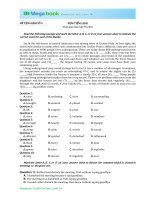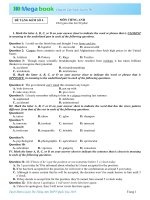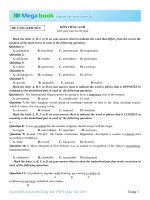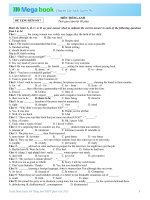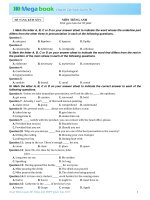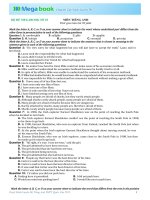- Trang chủ >>
- Đề thi >>
- Đề thi tuyển dụng
Đề thi GVG môn tiếng anh huyện bá thước năm 2011 2012 đề số 11
Bạn đang xem bản rút gọn của tài liệu. Xem và tải ngay bản đầy đủ của tài liệu tại đây (116.48 KB, 6 trang )
PHÒNG GIÁO DỤC & ĐÀO TẠO
HUYỆN BÁ THƯỚC
Đề số 11
KỲ THI GIÁO VIÊN GIỎI CẤP HUYỆN
NĂM HỌC : 2011 - 2012
ĐỀ THI MÔN: TIẾNG ANH
(Thời gian làm bài: 150 phút )
I. Choose one word whose underlined part is pronounced differently from the others by
circling the corresponding letter A, B, C, or D.
1. A. accurate
2. A. reduction
3. A. theory
4. A. happen
5. A. characteristic
B. customer
C. computer
B. popular
C. financial
B. generate
C. delicious
B. village
C. realize
B. environmentalC. Documentary
D. exercise
D. romantic
D. confidence
D. reality
D. sophisticated
II. Choose a word that has different stress partern:
1. A. influenced
2. A. host
3. A. boot
4. A. south
5. A. miles
B. terrified
B. most
B. book
B. truth
B. months
C. averaged
C. cost
C. hook
C. smooth
C. lakes
D. accompanied
D. post
D. foot
D. both
D. mates
III. Choose from the four options given (marked A,B,C and D) .One best answer to
complete each sentence by circling the corresponding letter a, b, c or d
1. When you are in a western country, your host may open a wrapped gift in front of you.
Opening a present in front of the gift-giver is ................ polite.
A. acquired
B. considered
C. known
D. called
2. Even if the host doesn’t like a present, he or she will tell a “white lie” and say …….. they
like the gift to prevent the guest from feeling bad.
A. how often
B. what
C. for what
D. how much
3. ……………. the low rainfall this year, the crops did not produce a high yield.
A. Since
B. Despite
C. Due to
D. Because
4. The color of your shirt does not ……….. that of your trousers.
A. suit
B. fit
C. harmonize
D. match
5. Many people love routine jobs which promise ………
A. security
B. sanguineness
C. vacancy
D. registration
6. An employer may look with…………. on a young college graduate.
A. suspect
B. suspicion
C. suspicious
D. suspiciously
7. Expressing one’s …………….. is one skill that the school can really teach.
A. thinking
B. thoughts
C. thoughtfulness D. thoughtlessness
8. As a model, you have to ………. the art of walking in high heels.
A. master
B. grasp
C. study
D. gain
9. An accident in the power station may result in large ………. of radiation being released.
A. numbers
B. number
C. amount
D. amounts
10. They are bring in ………….changes to the way the office is run.
A. large
B. radical
C. deep
D. immense
IV. Supply the correct tense or form of the verbs in brackets
1.
2.
3.
4.
5.
6.
The man who (rescue) had been in the sea for ten hours.
People always (blame) their circumstances for what they are.
You (stop) by a policeman if you (try) to cross the road now.
I was just about (leave) the office when the phone rang.
I’d rather (live) in Ancient Greece than Ancient Rome
Quick! There(be) an accident. Phone the hospital. The accident (happen) when that red
car (shoot) out of the side street without warning.
7. There (be) no guests at all since I left.
8. This palace (say)(build) in three years.
9. I know, but I can't help ( have) a cup of tea afer dinner. It is one of my greatest pleasures
since I quit (smoke).
10.By the end of this week my illness (cost) me $ 100
V. Fill each of the numbered blanks in the following passage. Use only One word in each
space)
Meeting old school friends again can be strange experience. Some have changed so
much that you can hardly recognise. They speak with different (1)........... , are interested in
different things, and all you can do to make (2)............ talk and hope they’ll go soon. Others,
though you may have been out of (3)............ with them for years, and just the same as they
were –it’s (4)............... if you last saw them yesterday. Before you know it, you are
exchanging (5) ...........about your families and friends, and setting out the (6)............. for
another game of class. A new change for the better, there’s one person that I get
(7) .............with very well now, though we weren’t on speaking (8)........... for our last two
years at school. One day we met at a party and made it (9).............. and (10)..............
engaged the same evening
VI. Read the passage and then choose the best answers.
ARTISANS AND INDUSTRIALIZATION
Before 1815 manufacturing in the United States had been done in homes or shops by
skilled artisans. As master craftworkers, they imparted the knowledge of their trades to
apprentices and journeymen. In addition, women often worked in their homes part-time;
making finished articles from raw material supplied by merchant capitalists. After 1815 this
older form of manufacturing began to give way to factories with machinery tended by
unskilled or semiskilled laborers. Cheap transportation networks, the rise of cities, and the
availability of capital and credit all stimulated the shift to factory production.
The creation of a labor force that was accustomed to working in factories did not occur
easily. Before the rise of the factory, artisans had worked within the home. Apprentices were
considered part of the family, and masters were responsible not only for teaching their
apprentices a trade but also for providing them some education and for supervising their
moral behavior. Journeymen knew that if they perfected their skill, they could become
respected master artisans with their own shops. Also, skilled artisans did not work by the
clock, at a steady pace, but rather in bursts of intense labor alternating with more leisurely
time.
The factory changed that. Goods produced by factories were not as finished or elegant as
those done by hand, and pride in craftsmanship gave way to the pressure to increase rates of
productivity. The new methods of doing business involved a new and stricter sense of time.
Factory life necessitated a more regimented schedule, where work began at the sound of a
bell and workers kept machines going at a constant pace. At the same time, workers were
required to discard old habits, for industrialism demanded a worker who was alert,
dependable, and self-disciplined. Absenteeism and lateness hurt productivity and, since work
was specialized, disrupted the regular factory routine. Industrialization not only produced a
fundamental change in the way work was organized; it transformed the very nature of work.
The first generation to experience these changes did not adopt the new attitudes easily.
The factory clock became the symbol of the new work rules. One mill worker who finally
quit complained revealingly about "obedience to the ding-dong of the bell-just as though we
are so many living machines." With the loss of personal freedom also came the loss of
standing in the community. Unlike artisan workshops in which apprentices worked closely
with the masters supervising them, factories sharply separated workers from management.
Few workers rose through the ranks to supervisory positions, and even fewer could achieve
the artisan's dream of setting up one's own business. Even well-paid workers sensed their
decline in status.
In this newly emerging economic order, workers sometimes organized to protect their
rights and traditional ways of life. Craftworkers such as carpenters, printers, and tailors
formed unions, and in 1834 individual unions came together in the National Trades' Union.
The labor movement gathered some momentum in the decade before the Panic of 1837, but
in the depression that followed, labor's strength collapsed. During hard times, few workers
were willing to strike or engage in collective action. And skilled craftworkers, who
spearheaded the union movement, did not feel a particularly strong bond with semiskilled
factory workers and unskilled laborers. More than a decade of agitation did finally bring a
workday shortened to 10 hours to most industries by the 1850's, and the courts also
recognized workers' right to strike, but these gains had little immediate impact.
Workers were united in resenting the industrial system and their loss of status, but they
were divided by ethnic and racial antagonisms, gender, conflicting religious perspectives,
occupational differences, political party loyalties, and disagreements over tactics. For them,
the factory and industrialism were not agents of opportunity but reminders of their loss of
independence and a measure of control over their lives. As United States society became
more specialized and differentiated, greater extremes of wealth began to appear. And as the
new markets created fortunes for the few, the factory system lowered the wages of workers
by dividing labor into smaller, less skilled tasks.
1.Which of the following can be inferred from the passage about articles manufactured
before 1815?
A. They were primarily produced by women.
B. They were generally produced in shops rather than in homes.
C. They were produced with more concern for quality than for speed of production.
D. They were produced mostly in large cities with extensive transportation networks.
2.Which of the sentences below best expresses the essential information in the
highlighted sentence in the passage? Incorrect answer choices change the meaning in
important ways or leave out essential information.
A. Masters demanded moral behavior from apprentices but often treated them
irresponsibly.
B. The responsibilities of the master to the apprentice went beyond the teaching of a
trade.
C. Masters preferred to maintain the trade within the family by supervising and
educating the younger family members.
D. Masters who trained members of their own family as apprentices demanded
excellence from them.
3.In paragraph 4, the author includes the quotation from a mill worker in order to
A. support the idea that it was difficult for workers to adjust to working in factories.
B. to show that workers sometimes quit because of the loud noise made by factory
machinery.
C. argue that clocks did not have a useful function in factories.
D. emphasize that factories were most successful when workers revealed their
complaints.
4.Which of the following statements about the labor movement of the 1800's is supported by
paragraph 5?
A. It was most successful during times of economic crisis.
B. Its primary purpose was to benefit unskilled laborers.
C. It was slow to improve conditions for workers.
D. It helped workers of all skill levels form a strong bond with each other.
5.The author identifies political party loyalties, and disagreements over tactics as two of
several factors that
A. encouraged workers to demand higher wages.
B. a created divisions among workers.
C. caused work to become more specialized.
D. increased workers' resentment of the industrial system.
VII The paragraphs of the magazine article are in the wrong order. Number the
paragraphs (A, B, C, D, E)
A. On the ghost of Chaffin’s second visit to his son, he told him that he would find a
will in the overcoat pocket. The coat was actually in the possession of the third brother.
B. In 1921, a certain James Chaffin died, leaving his entire fortune to his third son,
Marshal, in a will which had been written a full fifteen years earlier, in 1905, and signed in
front of witnesses. His wife and two other sons were virtually cut off without a penny.
Marshal was not inclined to split up the inheritance he had come into any more fairly.
C. Once it was found, they came across a note sewn in the lining of one of the pockets
saying they should look in an old family Bible. This Bible was found in the keeping of
Chaffin’s widow and examined in front of independent witnesses. Sure enough, there in the
Bible they discovered a later version of the will, one which divided the property and money
evenly between the widow and the three sons. The will appeared to be genuine and Marshal
was not prepared to challenge it in court.
D. Some people believe that the dead still keep in touch with us through our dreams.
One of the most famous and extraordinary cases of contact with the dead was the so-called
Chaffin Will affair.
E. Four years went by and then, strangely, James Chaffin’s ghost started to appear
before one of his other two sons. The apparition had on an old overcoat which had often
worn in life.
VIII. Give the correct form of the word in brackets
1.How much does ............... of this club cost?
(MEMBER)
2.She is extremely ............... about the history of art.
(KNOW)
3.Traveling in big cities is becoming more and more ............... every day. (TROUBLE)
4.He is completely ...............! Not only is he lazy but he is dishonest too.
(EMPLOY)
5.His boss told him off because he had behaved ...............(RESPONSIIBLE)
6.He won the discus event at the Olympic Games but was later ............... when a medical
check proved that he had been taking drugs. (QUALIFY)
7.Women who are slimming can never enjoy a meal without being afraid of ............... their
diet.
(ORGANISE)
8.The trouble with Mr. Brown is that he’s so ............... One minute he goes mad when you
come late; the next he says nothing. You never know where you are!
(CONSIST)
9.It is forbidden to hunt for that kind of bird. It has been listed as one of the ............... species
(DANGER)
10.I didn’t know who it was – with a mask on she was completely ...............
(RECONGNISE)
IX. Rewrite the sentence in such a way that it means the same as the sentence before it,
using the word in bracket and not altering it in any way.
1.Although he overslept, Clive wasn’t late for work
Despite not..............................................................................................................
2. John’s behavior at the party annoyed me
I was .......................................................................................................................
3. Go in to her and you’ll regret it
If you......................................................................................................................
4. Henry couldn’t get his parents’permission to buy a motorbike
Henry’s parents wouldn’t .....................................................................................
5. I didn’t agree with the idea.
I was not..................................................................................................................
6. He has been a policeman since he was 24
He joined.................................................................................................................
7. She couldn’t come to his party because she was ill
Because.................................................................................................................
8. My watch can not be repaired
They.........................................................................................................................
9. I haven’t seen Lan for two years
It’s two..................................................................................................................
10. I regret ever meeting him
I ...........................................................................................................................
X. Write a letter of complaint about the present traffic situation


